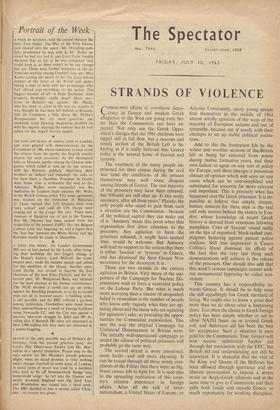Portrait of the Week-
A WEEK OF MYSTERY, with the central mystery the next Tory leader. The War of the Tory Succes- sion moved into the open: Mr. Maudling pub- licly proclaimed he was with it, Mr. Butler in- sisted he had not had it, and Lord Poole frankly declared that so far as he was concerned they could keep it, as there wasn't to be any change just yet There were further mysteries in the in- ternecine warfare among London's low set: Miss Keeler casting the pearls of her life story before readers of the News of the World and under- taking a duel of writs with her ex-manager who had offered tape-recordings to the police. The biggest mystery of all—is Peter Rachman. slum property developer, really dead? More mys- teries in Britain's spy system: Mr. Heath, who has been so silent in the last six months it was thought he had been left behind in Brussels, told the Commons a little about Mr. Philby's disappearance but left most questions un- answered. Lord Denning meanwhile plodded on with his inquiry, denying the rumour that he had called for the Argyll divorce papers.
THE KING AND QUEEN OF GREECE came to London, and were greeted with demonstrations by the Committee of 100, whose rowdiness at least saved the visitors froin the apathy the English usually reserve for such occasions At the ideological talks in Moscow, apathy among the Chinese dele- gation, which failed to turn up for one session; with the Russians publicly describing their brothers as 'defiant and impudent' the talks so far have been a shambles. President de Gaulle went home after a noticeably flat visit to Dr. Adenauer. Rather more successful was the mediation by London trade unionist Mr. Willis in the British Guiana strike. This week agreement was reached on the formation of Malaysia. U Thant warned that UN finances were now 'very critical' and said all UN troops were coming out of the Congo this year. There were rumours of Egyptian use of gas in the Yemen. that Mr. Nkomo had been sacked from the leadership of the banned ZAPU. that the Belgian Cabinet crisis was lingering on, and a eport that the 'hot line' between the White House and the Kremlin would be ready in December.
*.
A WEEK FOR PEERS: the London Government Bill was at last passed by the Lords, after bring- ing their lordships the two longest sittings in the House's history. Lord Milford, the Com- munist peer, made his maiden speech and called for the abolition of the House. Another peer, Lord Devlin, was invited to become the first chairman of the new Press Council, and the re- luctant peer, Mr. Wedgwood Benn, was adopted for the next election at his former constituency. The NUR decided it could not go on strike against the Beeching proposals, as to do so would wipe out all its invested assets: a building strike is still possible, and the BBC suffered a go-slow among technicians. Footballers were freed from their semi-serfdom as a result of George Eastham suing Newcastle FC, and the City was spared a massive take-over struggle by Shell and BP de- ciding that if Burmah Oil were not interested in their 000 million bid, they were not interested in a public haggling.
PRAYER IS 'the only possible way Of Britain's de- liverance from her present grievous state,' the Lord's Day Observance Society told Mr. Mac- millan in a special resolution. Prayer may be the only answer for Mr. Marples's present grievous plight, when he dared promise to raise parking meter charges fourfold in some areas of London. A novel form of travel was used by a birdman who tried to fly off Hammersmith Bridge with home-made wings: he fell into the Thames and nearly drowned. England won the third Test, and Wimbledon was rained into a third week. The BBC decided to ban a record called 'Chris- tine': no reason was given.


































 Previous page
Previous page